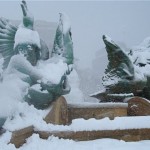 What are you reading, watching, thinking about this week? As usual, here’s a few which have been on our mind. Let us know your thoughts on any/all of them. If you have items you’d like us to consider for the top five, add them in the comments or send them to Tom or Mike.
What are you reading, watching, thinking about this week? As usual, here’s a few which have been on our mind. Let us know your thoughts on any/all of them. If you have items you’d like us to consider for the top five, add them in the comments or send them to Tom or Mike.
Photo Credit: Philadelphia’s Swann Memorial Fountain, blizzard-style, from Eddie Hales via Flickr. Click for a larger image.
1. Is there a place in the academy for the Christian worldview? (Jesus Creed) RJS, a regular guest blogger at Scot McKnight’s Jesus Creed blog and a science professor at a major research university, shares a recent conversation with a friend about the role of the Christian worldview in the university. A brief except:
If one accepts methodological naturalism consistently as the basis for academic inquiry and rational thought, it follows that Christianity and religious belief have no place in the university, or in rational discussions, except to do autopsy on them. We must concede that a scientific-historical understanding of Christianity must be built with no reference to the possibility that He rose from the dead. We must accept that our own beliefs must be explained in evolutionary and neurological terms, without reference to the possibility that they are true.
The whole thing (and the ensuing conversation) is worth reading.
2. What news do people like to share? News that is awe-inspiring (John Tierney, NY Times, Feb. 8, 2010). Here’s how one of the researchers, Jonah Berger of Penn’s Wharton School, explained it:
“Emotion in general leads to transmission, and awe is quite a strong emotion,” he said. “If I’ve just read this story that changes the way I understand the world and myself, I want to talk to others about what it means. I want to proselytize and share the feeling of awe. If you read the article and feel the same emotion, it will bring us closer together.”
Sarah Pulliam Bailey at GetReligion.org explores some of the religious implications of this research.
3. Preparing for the Lenten Journey: Take a moment to reflect upon Lent is not a Ritual (Christine Sine, 2/9/2010). If you have a post to share with regard to the Lenten journey join the contributors to Walking with Jesus to the Cross: How Do We Follow (Christine Sine, 1/12/2010).
4. Byron Borger’s Best Books of 2009 (Part II) is finally up. If you combine Part II with Part I, you’ll have a short book which is well worth the read 😉 Of course maybe you just want to skim through it to find an award which has most interest to you, for example, “Best Book in the History of Science: The Setting the Record (At Least Somewhat) Straighter(er) Award.” Which reminds me (Tom), I should post some thoughts/excerpts from Galileo Goes to Jail and Other Myths about Science and Religion (earlier post: An Obituary for the “Warfare” View of Science and Religion). Anyone interested in an on-line discussion of Galileo Goes to Jail?
5. Sociologists Get Religion (Inside Higher Ed, Feb. 9, 2010): Following on the heels of the American Historical Association’s analysis showing that religion is now the most popular research topic among historians, David Smilde and Matthew May of the U. Georgia have released a working paper entitled “The Emerging Strong Program in the Sociology of Religion.” Their research finds that the study of religion has been steadily increasing among sociologists:
The changes outlined in the report “are pretty significant” and show “a realization on the part of sociologists and other academics, too, of the enduring significance of religion in the modern world,” said Neil Gross, an associate professor of sociology at the University of British Columbia. Gross studies the sociology of academic life, and while he noted “the stereotype that most professors don’t pay attention to religion,” he added that it has “never really been true.”
IVP Associate Publisher Andy LePeau has weighed in with two comments: (paraphrased) “Duh! Of course, religion is important to sociology!” and this keen insight that, as sociologist can probably affirm, our communities shape our expectations of what’s important and what’s not:
It’s easy to deride the obvious blind spots of the media and the academic establishment. They are, ironically, so parochial and insular. They just don’t get out of their own closed circles very much to see what the world is really like.
Unfortunately, the same can be said about us. Well, OK, it can be said about me. I tend to hang with people who are like me, who think like me, value the things I value, who have a background like mine. I occasionally read something by someone I really disagree with, and that’s good. But it’s just not the same as encountering real live people who are very different.
The former Associate Director for the Emerging Scholars Network, Micheal lives in Cincinnati with his wife and three children and works as a web manager for a national storage and organization company. He writes about work, vocation, and finding meaning in what you do at No Small Actors.

Thanks for the mention and for making me aware of other great resources for the week